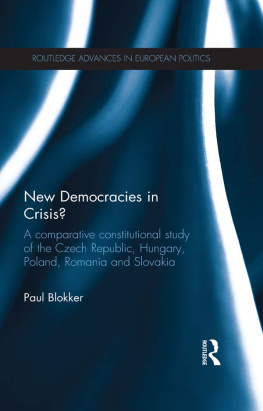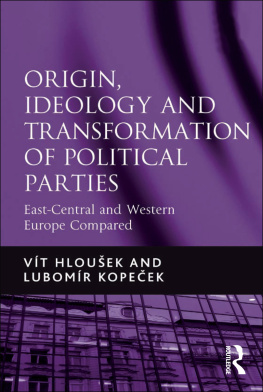Institutional Design and Party Government
in Post-Communist Europe
Csaba Nikolenyi
Comparative Politics is a series for students, teachers, and researchers of political science that deals with contemporary government and politics. Global in scope, books in the series are characterized by a stress on comparative analysis and strong methodological rigour. The series is published in association with the European Consortium for Political Research. For more information visit www.ecprnet.eu
The Comparative Politics series is edited by Kenneth Carty, Professor of Political Science, University of British Columbia; Ferdinand Mller-Rommel, Director of the Center for the Study of Democracy, Leuphana University; and Emilie van Haute, Professor of Political Science, Universit libre de Bruxelles.
OTHER TITLES IN THIS SERIES
Representing the People
A Survey Among Members of Statewide and Substate Parliaments
Edited by Kris Deschouwer and Sam Depauw
New Parties in Old Party Systems
Persistence and Decline in Seventeen Democracies
Nicole Bolleyer
The Limits of Electoral Reform
Shaun Bowler and Todd Donovan
The Challenges of Intra-Party Democracy
Edited by William P. Cross and Richard S. Katz
If Money Talks, What Does it Say?
Corruption and Business Financing of Political Parties
Iain McMenamin
The Gendered Effects of Electoral Institutions
Political Engagement and Participation
Miki Caul Kittilson and Leslie A. Schwindt-Bayer
The Strain of Representation
How Parties Represent Diverse Voters in Western and Eastern Europe
Robert Rohrschneider and Stephen Whitefield
Party Patronage and Party Government in European Democracies
Edited by Petr Kopeck, Peter Mair, and Maria Spirova
Organizing Democratic Choice
Party Representation Over Time
Ian Budge, Michael McDonald, Paul Pennings, and Hans Keman
Challenging the State Devolution and the Battle for Partisan Credibility
A Comparison of Belgium, Italy, Spain, and the United Kingdom
Sonia Alonso
- Great Clarendon Street, Oxford, OX2 6DP,
- United Kingdom
- Oxford University Press is a department of the University of Oxford.
- It furthers the Universitys objective of excellence in research, scholarship,
- and education by publishing worldwide. Oxford is a registered trade mark of
- Oxford University Press in the UK and in certain other countries
- The moral rights of the author have been asserted
- First Edition published in 2014
- All rights reserved. No part of this publication may be reproduced, stored in
- a retrieval system, or transmitted, in any form or by any means, without the
- prior permission in writing of Oxford University Press, or as expressly permitted
- by law, by licence or under terms agreed with the appropriate reprographics
- rights organization. Enquiries concerning reproduction outside the scope of the
- above should be sent to the Rights Department, Oxford University Press, at the
- address above
- You must not circulate this work in any other form
- and you must impose this same condition on any acquirer
- Published in the United States of America by Oxford University Press
- 198 Madison Avenue, New York, NY 10016, United States of America
- British Library Cataloguing in Publication Data
- Data available
- Library of Congress Control Number: 2013956533
- Printed in Great Britain by
- CPI Group (UK) Ltd, Croydon, CR0 4YY
(p.v) To my Andrea,

(p.vi) Acknowledgements
I owe a deep gratitude to my colleagues, friends, students, and my family whose encouragement and support has made this book possible. My very special thanks to Ken Carty, Reuven Hazan, Bernard Grofman, Steven B. Wolinetz, Keith Dowding, Shaul Shenhav, Ian McAllistar, Bjorn-Erik Rasch, Hanna Beck, and Patrick Dumont for their comments and feedback on earlier drafts in conferences, workshops, and seminars. The Department of Political Science at the Hebrew University, the Department of Political Science at Concordia University, and the Center for European Studies of the Australian National University provided me with opportunities to present and discuss the work at different stages. My research would not have been possible without the generous financial assistance provided by the Social Sciences and Humanities Research Council of Canada, Concordia University, and the Center for European Studies of the Australian National University. I was fortunate to have at my disposal the able and dedicated assistance of a number of graduate and undergraduate research assistants from the Department of Political Science at Concordia University. My very special thanks to Dr Marat Grebennikov, Nancy Yacoub, Randy Pinsky, and Brent Gerchicoff. I am indebted to Oxford University Press for the reviewers helpful comments as well as the speed and efficiency of the editorial team. Any mistake, error of commission, or omission remains, of course, my own. Concordia Universitys Faculty of Arts of Science allowed me to spend time away from my teaching and service duties and accept a Visiting Fellowship from the Center for European Studies of the Australian National University during the critical final stage of finishing the manuscript in December 2012.
My wife, Andrea, was a constant source of support and encouragement in times of doubt. My work would never haven been completed without her help and questioning spirit. My father, Gabor, Zsuzsanna, and my in-laws, Drs Csilla and George Gondos have been supportive in many more ways than one can imagine to help my dreams come true. My interest in political life was inspired by my dear mother, Edit, who passed away much too young and early to see this work completed. I remain in her debt forever.
(p.viii) List of Figures
(p.ix) List of Tables
1.1
2.1
2.2
2.3
2.4
3.1
3.2
3.3
3.4
4.1
4.2
4.3
4.4
4.5
5.1
5.2
5.3
6.1
6.2
7.1
7.2
7.3
7.4
Introduction
1.1 Multi-Party Government in East Central Europe
In their seminal study on the politics of multi-party government, Laver and Schofield pointed out that [f]or most of Western Europe, the politics of coalition lie at the heart of business of representative government (1990: 1). Twenty years later Strom, Mller-Rommel and Bergman have reiterated the same point by noting that [o]ver the course of the twentieth century, the proportional version of parliamentarism has become the most common form of democratic governance, and nowhere is it more dominant than in Western Europe.Because proportional systems rarely reward any party with a parliamentary majority, this form of government depends on and is conducive to inter-party bargaining over high stakes (2010: 403). Evidently, there is no denying of the importance of coalition politics in Western Europe. However, proportional parliamentarism has become an equally common and dominant form of organizing the new post-communist democracies of East and Central Europe (ECE), and yet a systematic study of post-communist party coalition is sorely lacking in the comparative literature (Mller-Rommel, Fettelschoss and Harfst ).












